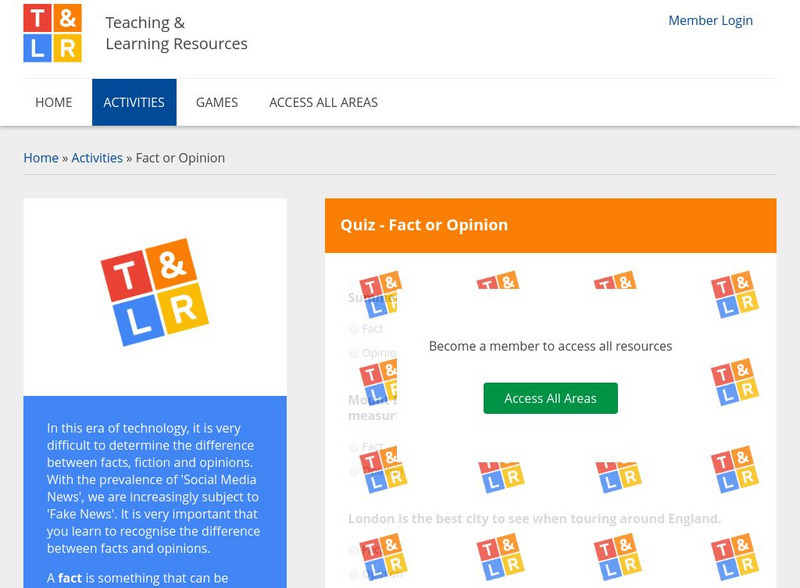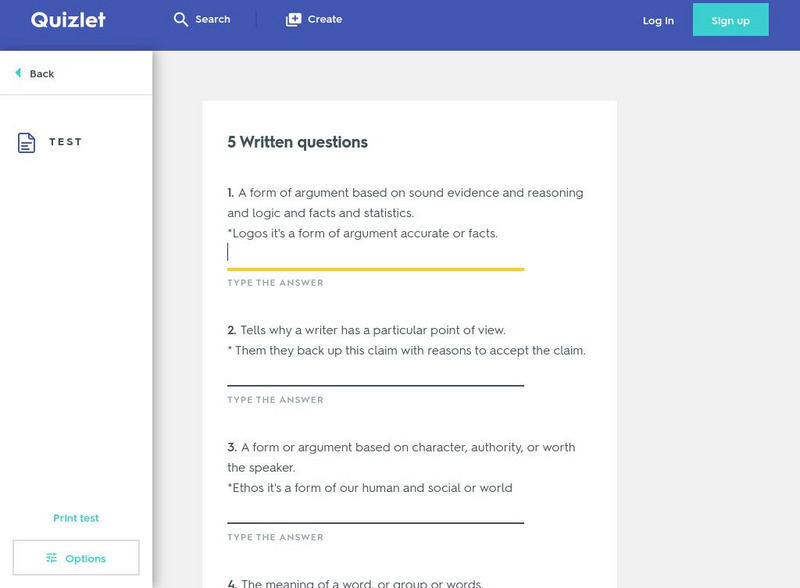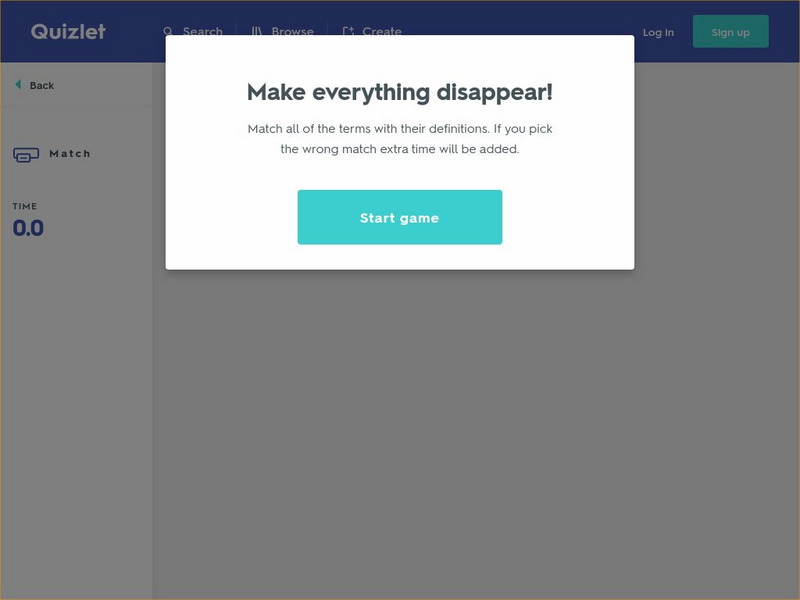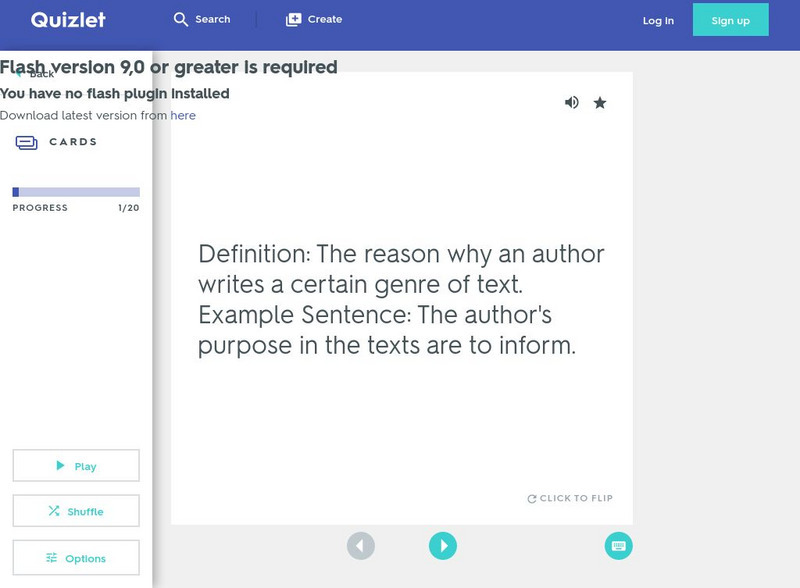Quia
Quia: Making Inferences, Summaries, and Conclusions
Read a short text and then choose the correct inference, summary, or conclusion in this Rags to Riches style game.
Other
Cuesta College: Reading Comprehension Guide: Inferences and Conclusions
Explanations and examples of inferences and conclusions in reading and in understanding context clues to define unknown vocabulary.
TES Global
Blendspace: Argument Writing: Homework
A learning module with links to eight websites to use while writing an argumentative essay on how beneficial homework is.
Intel Corporation
Showing Evidence Tool: Analyzing and Evaluating Information
If you're looking for a way to engage students in analyzing and evaluating evidence, rather than simply piling up information, this tool may be a boon. Students can use it to construct an argument, rate the quality of resources, and...
University of Toronto (Canada)
University of Toronto: The Book Review or Article Critique
This site presents a series of questions to ask yourself before writing a book review or article critique. Most appropriate for non-fiction works.
ClassFlow
Class Flow: Writing a Persuasive Essay
[Free Registration/Login Required] This flipchart discusses the structure and procedure for writing a persuasive essay. Assessment questions are included.
ClassFlow
Class Flow: Fact and Opinion
[Free Registration/Login Required] Designed for grade 6, this flipchart covers the differences between fact and opinion. Students will analyze statements to determine if they are a fact or if they are an opinion.
ClassFlow
Class Flow: Fact or Opinion
[Free Registration/Login Required] This flipchart reviews the definitions of fact and opinion and gives the students opportunities to sort and identify fact and opinion statements.
FNO Press
From Now On: The Research Cycle, 2000
Excellent site from From Now On for students who are assigned research papers and need to begin finding and reading material. Part of a book, the site gives information on questioning, evaluating, planning, gathering, sorting,...
Houghton Mifflin Harcourt
Holt, Rinehart and Winston: Elements of Literature: Historical/biographical Analysis Chart [Pdf]
A short graphic organizer which allows students to assess the historical and biographical influence on a piece of literature.
Houghton Mifflin Harcourt
Holt, Rinehart and Winston: Holt Assessment: Evaluating Nonfiction [Pdf]
This one-page printable worksheet is designed for classroom use in evaluating a reading of nonfiction. The evaluation is set up in a rubric format.
ClassFlow
Class Flow: What Is an Inference?
[Free Registration/Login Required] This flipchart defines what an inference is and helps students understand the concept using Activote to review and practice.
Other
Prezi: Explicit vs. Implicit
Slideshow explains the difference between explicit and implicit meaning in texts and visuals. Includes good examples and practice questions.
Other
Teaching and Learning Resources for Ks2 (Ages 7 12):literacy: Fact or Opinion?
This is a 10 question, self-scoring quiz on separating fact from opinion. Students read a sentence and select "fact" or "opinion" from the drop-down menu.
The History Cat
The History Cat: How to Write a Quality Cer (Claim Evidence Reasoning) [Ppt]
Presents an assignment where students must write an essay that includes a thesis statement, claims, evidence, reasoning, and a conclusion. Each of these is explained in the slideshow and a written example is provided.
Quizlet
Quizlet: Making Inferences (Nonfiction)
Build your nonfiction inference vocabulary by interacting with terms like lesson, data, schema, sources, and more. Choose to view flashcards, complete learning and spelling exercises, take a test, or play a matching or gravity game.
Quizlet
Quizlet: Prediction and Inference Terms Test
A test with five matching questions and 4 multiple choice questions over the following literary terms: prediction, inference, suspense, foreshadowing, character, character traits, motivation, denotation, and connotation.
Quizlet
Quizlet: Claim & Support: Test
This interactive assessment features 10 match and 10 multiple choice questions over 20 vocabulary words relating to argumentative writing claims and support.
Quizlet
Quizlet: Claim and Support Vocabulary: Quiz
This interactive assessment features 7 matching, 7 multiple-choice, and 6 true/false questions over 20 vocabulary words relating to argumentative writing claims and support.
Quizlet
Quizlet: Claim and Support Vocabulary: Match
In this interactive game, students match vocabulary words relating to argumentative writing claims and support to their definitions. The game can be played multiple times to use all 20 words.
Quizlet
Quizlet: Claim and Support Vocabulary: Flashcards
This set of interactive flashcards focuses on 20 vocabulary words relating to argumentative writing claims and support. It provides the definitions and an example sentence for each word.
Other
Oakland Writes: Student Exemplars: Eighth Grade: Literary Analysis [Pdf]
A literary analysis essay written by an eighth-grader with notes calling attention to important writing concepts evident in the essay including a well-written title, opening sentence, logical analysis, supporting details including quotes...



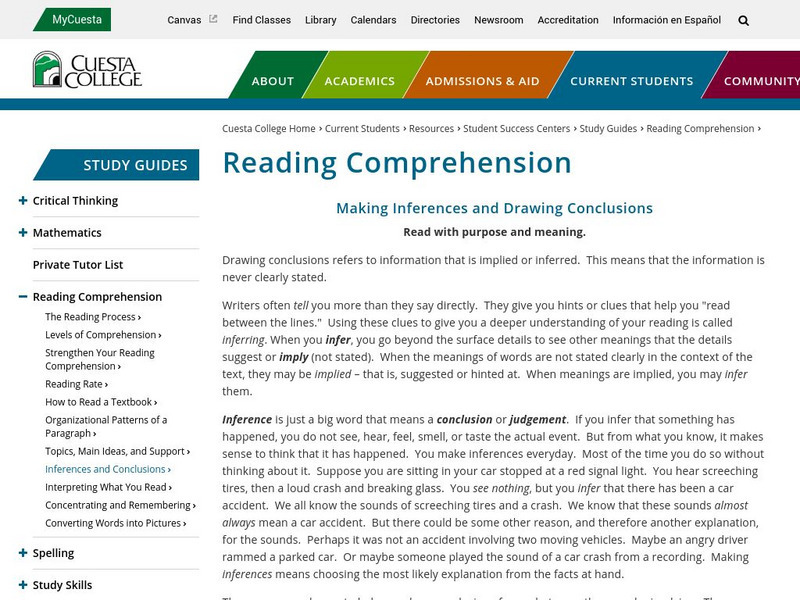







![Holt, Rinehart and Winston: Elements of Literature: Historical/biographical Analysis Chart [Pdf] Graphic Holt, Rinehart and Winston: Elements of Literature: Historical/biographical Analysis Chart [Pdf] Graphic](https://d15y2dacu3jp90.cloudfront.net/images/attachment_defaults/resource/large/FPO-knovation.png)

